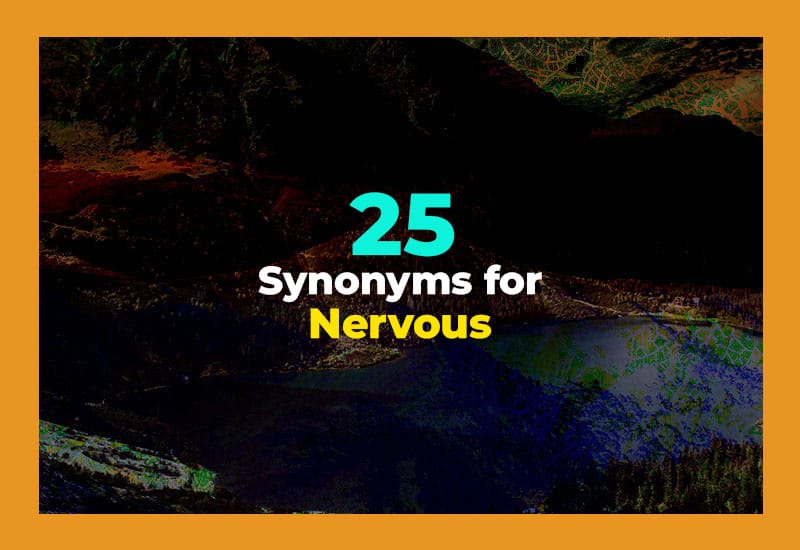You know that feeling when your heart races before a big event? Like waiting for a test or talking to someone new? That jittery, uneasy feeling is what we call nervous. But guess what? There are lots of other words you can use instead of nervous to sound more fun and interesting. Let's explore 25 cool words that mean nervous, with easy examples you'll remember.
1. Anxious
Anxious means feeling worried or uneasy about something that might happen. For example, she felt anxious before her job interview because she didn't know what questions would be asked. When you are anxious, your mind thinks about the possible problems ahead. It is normal to feel anxious when waiting for important news or when you have to do something new. Being anxious can make your hands sweat or your stomach feel funny.
2. Apprehensive
Apprehensive means you are a little scared or unsure about what will happen. For example, he was apprehensive about going to the dentist because he had never been before. When you feel apprehensive, you are cautious and maybe a bit nervous. It is like a warning in your head telling you to be careful. This feeling helps you prepare for things that seem hard or scary.
3. Uneasy
Uneasy means feeling uncomfortable or worried about something. For example, she felt uneasy walking alone at night because it was dark and quiet. When you are uneasy, you don't feel calm. Your mind might keep thinking about what could go wrong. It is a small type of nervousness that makes you want to be safe or avoid trouble.
4. Jittery
Jittery means feeling shaky or jumpy because of nerves. For example, he was jittery before his speech, shaking his hands. When you feel jittery, it's like your body is full of energy that you cannot control. This often happens before big moments like a game or a test. Your heart beats faster, and you might feel like you can't sit still.
5. Tense
Tense means your body or mind is tight and full of stress. For example, she felt tense during the exam and couldn't relax. When you are tense, your muscles might feel tight, and you might breathe faster. It is your body's way of getting ready to face something hard or scary. Being tense for a short time is normal, but too much can make you feel very tired.
6. Restless
Restless means you cannot sit still or calm down because you feel nervous or excited. For example, he was restless waiting for the test results and kept pacing. When you are restless, your mind is busy, and your body wants to move. This feeling is common when you don't know what will happen next and you want to do something about it.
7. Fidgety
Fidgety means moving your hands or feet a lot because you feel nervous or bored. For example, the student was fidgety during the long class, tapping his pencil nervously. When you are fidgety, you might play with your hair, shake your legs, or bite your nails. It shows you are not feeling calm inside, maybe because you are worried or anxious.
8. On edge
On edge means feeling very nervous and ready to react quickly. For example, she was on edge before the big meeting and kept checking her phone. When you are on edge, your nerves are tight like a spring. Small things might bother you more than usual. It's like your body and mind are waiting for something to happen and can't relax.
9. Agitated
Agitated means feeling upset and nervous at the same time. For example, he became agitated when the traffic made him late for work. When you are agitated, your feelings are mixed up and hard to control. You might feel angry or worried, and your body might shake a little. This state happens when stress or nerves build up for some time.
10. Shaky
Shaky means your body or hands move because you feel nervous or scared. For example, her hands were shaky when she held the microphone to speak. When you are shaky, your muscles don't feel steady. This happens when your nerves make your body react fast. Shakiness often shows when you are very nervous or excited about something.
11. Timid
Timid means feeling shy and nervous, especially when meeting new people or trying new things. For example, the timid child hid behind his mother at the party. When you are timid, you may not speak much or try to avoid attention. It's a quiet kind of nervousness that makes you feel unsure about yourself.
12. Uneasy
Uneasy means feeling worried or uncomfortable about something you can't control. For example, she felt uneasy about walking home alone after dark. It's a small nervous feeling that makes you cautious. You might check around more or move faster. Uneasy is like a quiet alarm that tells you something might not be right.
13. Worried
Worried means thinking about problems and feeling upset. For example, he was worried about the test results all night. When you are worried, your mind focuses on what could go wrong. This feeling makes it hard to relax. It is a very common type of nervousness that helps you prepare for challenges.
14. Skittish
Skittish means nervous and easily scared or surprised. For example, the skittish dog jumped at every sound. When you are skittish, small things make you jump or feel scared. It's like your nerves are very sensitive. People or animals can be skittish when they are not comfortable or trust their surroundings.
15. Alarmed
Alarmed means feeling sudden fear or worry about something unexpected. For example, she was alarmed when the fire alarm rang during class. When you are alarmed, your body reacts quickly, like your heart beats faster and you want to run. It is a sharp, strong kind of nervous feeling that happens fast.
16. Edgy
Edgy means feeling tense and nervous, like you might get upset soon. For example, he was edgy after a long day of hard work. When you are edgy, small problems feel bigger. Your nerves are tight, and you might get angry or sad easily. Edgy is a mix of nervousness and irritation.
17. Nervy
Nervy means being bold or a little bit nervous but still doing something brave. For example, it was nervy of her to sing in front of the whole school. When you are nervy, you feel your nerves but keep going. It is like being scared but strong at the same time.
18. Uneasy
Uneasy means feeling not safe or not comfortable. For example, he felt uneasy in the dark alley. When you feel uneasy, your body tells you something might be wrong. You might want to leave or be more careful. It's a soft nervous feeling that keeps you alert.
19. Distraught
Distraught means feeling very upset and nervous because something bad happened. For example, she was distraught after losing her phone. When you are distraught, your mind is full of worry and sadness. It is a strong feeling that makes it hard to think clearly or calm down.
20. Flustered
Flustered means feeling nervous and confused, often when you don't know what to say or do. For example, he got flustered when asked a hard question in class. When you are flustered, your mind and body feel mixed up. You might blush, stumble over words, or look around nervously.
21. Stressed
Stressed means feeling nervous and under pressure because of too many things to do. For example, she was stressed before finishing her project on time. When you are stressed, your body feels tired, and your mind feels busy with worries. It can make it hard to relax or sleep.
22. Worried
Worried means feeling concerned about something that might go wrong. For example, he was worried about missing his flight. When you feel worried, you think about bad things that could happen. This feeling makes your heart beat faster and your mind busy.
23. Twitchy
Twitchy means moving in small quick ways because of nerves or excitement. For example, the twitchy player couldn't sit still before the game. When you are twitchy, your body feels like it wants to move a lot. It shows that you are nervous or very alert.
24. Hesitant
Hesitant means feeling unsure and nervous about doing something. For example, she was hesitant to ask for help because she felt shy. When you are hesitant, you take time to think before acting because you worry about what might happen.
25. Shy
Shy means feeling nervous around others, especially new people. For example, the shy girl didn't speak much at the party. When you are shy, you feel quiet and nervous. You might avoid eye contact or stay close to friends. It's a gentle kind of nervousness that makes you want to hide a little.

I hope this list helps you find the perfect word to describe your nervous feelings. Using different words can make your writing and talking more interesting and clear. Next time you feel nervous, try one of these words to explain yourself better. It's fun to learn new words and use them in real life!









